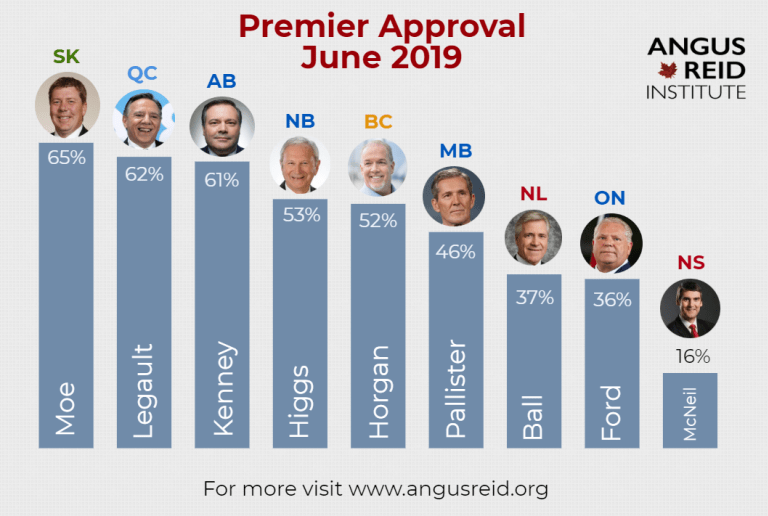Saskatchewan loves its leader.

Premier Scott Moe had a 65 per cent approval rating in a recent Angus Reid survey, the highest of all premiers in Canada.
The rating is up six percentage points from the last quarter, and up 13 points since March 2018.
Quebec’s Premier François Legault and Alberta’s Jason Kenney were a close second and third place with 62 and 61 per cent approval ratings, respectively.
A notable trend with Moe and Kenney is the shared disdain for the carbon tax, and a plan in place to tear it down.
The Angus Reid Institute report points to Kenney’s introduction of the Carbon Tax Repeal Act and Moe’s appeal of the tax in Saskatchewan’s highest court.
It’s not the same story for Legault, who is actively fighting against pipelines and is in favour of the carbon tax.

Get daily National news
Coming in last place is Nova Scotia Liberal Stephen McNeil, who is also Canada’s longest-serving premier and recently experienced tension with the education and health authorities in that province.
Rounding out the bottom three is Ontario’s Doug Ford and Newfoundland and Labrador’s Dwight Ball. Ball lost his Liberal government’s majority in May.
Ford has been recently criticized for cuts to healthcare and education, and his headlining antics.
In the middle of the pack, is New Brunswick’s Blaine Higgs, with a 53 per cent approval rate and who recently started work on reviving the Energy East Pipeline.
Sharing the middle ground with Higgs, but not sharing views, is B.C.’s NDP Premier John Horgan with 52 per cent, who is vocal about opposing pipelines due to their environmental impact.
Manitoba’s Brian Pallister’s approval rating sits at 46 per cent, another conservative Premier who is in favour of pipelines but has signed on to a provincial carbon tax.
The survey’s results are from the first quarter of 2019.
The Angus Reid Institute analyzed the results of an online survey between May 28 – June 4, 2019, among a representative randomized sample of 5,807 adult Canadian residents who are members of the Angus Reid Forum. Probability samples of this size would carry varying margins of error based on each province’s sample size. Discrepancies in or between totals are due to rounding.









Comments
Want to discuss? Please read our Commenting Policy first.